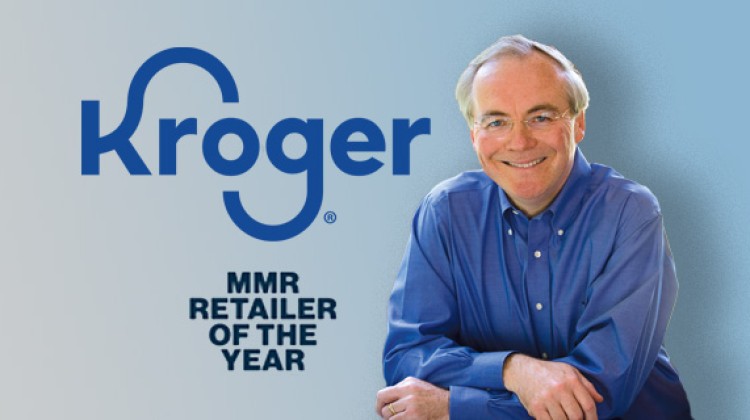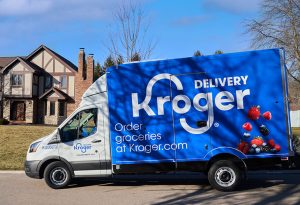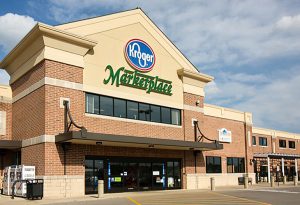
CINCINNATI — The editors of Mass Market Retailers have named Rodney McMullen the publication’s Retailer of the Year. The recognition for Kroger’s chairman and chief executive officer will rightly be linked to the company’s pending $24.6 billion merger with Albertsons Cos., but the deal is only one aspect of the work that McMullen has done to reinforce Kroger’s position as the nation’s premier operator of traditional supermarkets. Under his direction, the company has in recent years developed a potent omnichannel offer, making grocery shopping easier and more convenient; honed the in-store experience; and become a forceful advocate for good nutrition and the concept of food as medicine.
All of this activity is governed by a higher purpose — Kroger’s commitment to “feed the human spirit.” McMullen explains that the aspiration took shape after focus groups with both associates and customers highlighted the importance of positive social interaction within a retail setting.
“The thing that’s magical about one of our stores isn’t a can of corn or another product a shopper might find, it’s our associates and their ability to help somebody have a little bit better day,” he says. “When we talk about feeding the human spirit, we’re trying to remind associates that every interaction matters. During COVID that really showed up, but we just want to make sure that customers love to shop in one of our stores and our associates love to work at one of our locations, because we have so many people that come for a job and discover a career.”
McMullen speaks from experience. He began working at a Kroger outlet in Lexington, Ky., in 1978, as a part-time stock clerk and quickly rose through the ranks. In 2009, McMullen was named president and chief operating officer, becoming CEO a decade ago.
One of the boldest moves McMullen made during his tenure as Kroger’s top executive was to enter a partnership with Ocado Group, a British firm that specializes in online grocery retailing technology. Signed in 2018, the deal, which is exclusive in the United States, covers as many as 20 automated customer fulfillment centers, or “sheds,” as they are commonly referred to within the company, eight of which are already in operation.
“Ocado is a great partner,” McMullen says. “The net promoter score on deliveries from the sheds is always the highest relative to our stores and pickup. So e-commerce is an important part of that overall ecosystem, which we want to be seamless. Our aspiration is that if somebody thinks food, they think Kroger; then we deliver against that, whatever that customer wants at that particular point in time.”
The sheds not only enable Kroger to meet consumer demand for quality and convenience, they open the way for the company to extend its geographic reach without incurring the cost of building a lot of brick-and-mortar stores. Florida is a case in point.
 “We have one store in Florida, which is such an amazing state, given the population growth and the demographics,” notes McMullen. “We moved into Florida through the partnership with Ocado and one of the sheds. And we are doing that in several places. In some instances, we use the shed that’s in an existing market and do a spoke in another market that’s new for us. That’s how we went into Austin and Oklahoma City, for example.”
“We have one store in Florida, which is such an amazing state, given the population growth and the demographics,” notes McMullen. “We moved into Florida through the partnership with Ocado and one of the sheds. And we are doing that in several places. In some instances, we use the shed that’s in an existing market and do a spoke in another market that’s new for us. That’s how we went into Austin and Oklahoma City, for example.”
Thus far the growth of Kroger’s e-commerce business is in line with expectations. “Year on year, it’s increasing substantially,” he says. “For us, the repeat usage rate is absolutely critical, and that number tells us that our customers really like the omnichannel options that we offer.”
The boom in e-commerce hasn’t caused McMullen and his colleagues to neglect the heart of Kroger’s ecosystem, its 2,721 physical stores, which operate under multiple banners in 35 states and the District of Columbia. Shopping those locations gives the company and its associates unique opportunities to connect with consumers and, more than anything else, defines the Kroger brand of retailing.
Citing the example of Murray’s Cheese, an artisanal brand owned by Kroger and sold in its stores, McMullen points out that product sampling and interaction with associates are things that can’t be replicated online. “You can only find that broader experience with the smell of the food and the taste of the food in the store,” he says.
“When customers start engaging with us through multiple channels, they go to a store when they want to, as opposed to when they have to. And when they do that, they start out with a more open mind about trying new things.”
McMullen adds that understanding the enduring value of the store — and the parts of it that can’t be duplicated digitally — doesn’t mean Kroger is content with the status quo. Its supermarket formats will continue to evolve.
“I’ve been around this business for a long, long time, and if you look at the size of the overall store, it stays about the same or keeps getting a little bigger,” he notes. “But if you look at what’s inside the store, that always changes. So I think you’ll see more focus on the fresh departments, probably even more space dedicated to beer and wine, because there are so many new brands coming out.”
Other innovations impact the manner in which Kroger communicates with customers in challenging economic times. Digital tools are playing a particularly important part in the drive toward personalization.
“Investments in our personalized capabilities ensure we are meeting elevated customer demand for savings and enable us to deploy promotional dollars more effectively,” he says. “Digital offers have increased compared to last year, and our personalization capabilities have resulted in even more significant increase in redemptions, driving loyalty and increasing digitally engaged households this quarter by 13%.
“Digitally engaged households are incredibly valuable to our model, as they are more loyal, spend nearly three times more with us, and accelerate growth in our alternative profit businesses.”
Kroger’s scale is national — it is the largest traditional grocer in America, with annual sales of $148.3 billion — but its focus is local. That orientation is evident in everything from the merchandise mix to involvement in the community.
“Most of our customers will only shop at one to three stores,” says McMullen, “and I have an amazing uplift when I’m talking to a customer and they refer to my Ralph’s or my Fred Meyer or my Kroger, because when we do it right, that local store really is their store. I was in Colorado during the summer and we carried Olathe Corn, which is amazing. And if you didn’t have Olathe Corn, Rocky Ford Cantaloupe and things like that in Colorado, people just wouldn’t feel like that store’s local. To me that’s what’s magical about what we do.
“It’s the same when you look at supporting the community. We were a founding member of Feeding America [the nation’s largest nonprofit organization dedicated to alleviating hunger]. Those relationships are maintained at the local level in our partnership with food banks. Those are the kinds of things that make us an integral part of the community.”
In the aggregate, ongoing work with food banks comprises a huge commitment on the part of Kroger, which has already contributed more than 3 billion meals. McMullen — who puts the effort in perspective by pointing out that the donations to date “would feed everybody in Iceland for the whole year for every meal they eat and still have plenty left over” — indicates that, together with Albertsons, Kroger will provide 10 billion meals by 2030.
McMullen remains bullish about the pending merger. The addition of Albertsons’ stores (which will total around 1,800 after divestitures) will give the combined company more than 4,500 locations in 48 states, along with a robust distribution network and manufacturing facilities.
“If you look at the time line, we’ve always thought the deal would be finalized in early 2024,” he says, “and we continue to be on track with that. There’s active dialogue with the regulators, as you would expect in a transaction this big.
“The merger will create certain capabilities. We’ve committed to starting on day one to lower prices over four years by $500 million. We’ve committed to continue to invest in wages for associates — which both of our companies have done over the last several years.”
McMullen adds that the merger will almost certainly bring other unexpected benefits.
 “Every time we’ve merged with somebody, there are always a few things they do better than Kroger that we’re able to scale into the combined company,” he notes. “Almost half of our senior leaders have come from one of our merged companies. I’m even more excited now than when we announced the merger. We’re almost to the point where we can go start taking care of customers and start supporting our associates.”
“Every time we’ve merged with somebody, there are always a few things they do better than Kroger that we’re able to scale into the combined company,” he notes. “Almost half of our senior leaders have come from one of our merged companies. I’m even more excited now than when we announced the merger. We’re almost to the point where we can go start taking care of customers and start supporting our associates.”
Kroger’s management team is confident that the divestiture plan it announced in September will satisfy the Federal Trade Commission, clearing the way for the merger to proceed. Kroger and Albertsons plan to sell 413 stores and eight distribution centers to C&S Wholesale Grocers for $1.9 billion.
“C&S is a great company,” says McMullen. “They’ve been in business for over a hundred years. They love retail, they love wholesale. They have an amazing amount of talent. They’ve committed to recognizing existing labor contracts — which is something that we were looking for in a buyer — and continuing to invest in wages, continuing to invest in retail. I believe they will treat people at those stores just like we would’ve treated them.”
Treating people well has been the bottom line for McMullen throughout his career. And today, customers and associates remain the focal point when he makes decisions about the company’s future direction, including further development of such alternative profit businesses as Kroger Precision Marketing and Kroger Health.
“One of the questions that people always ask is, if a company ceased to exist, would somebody miss it? If Kroger didn’t exist, I know people tonight wouldn’t have an amazing meal that they get to celebrate with family and friends. I know that people that aren’t as fortunate as we are and depend on a food bank wouldn’t have the support they need. Those kinds of things are just so inspiring. I’m incredibly lucky to work at the company that I do and to get to work with the people I do, because all we’re trying to do is to help somebody have a better day. It’s an amazing experience.”




You must be logged in to post a comment Login